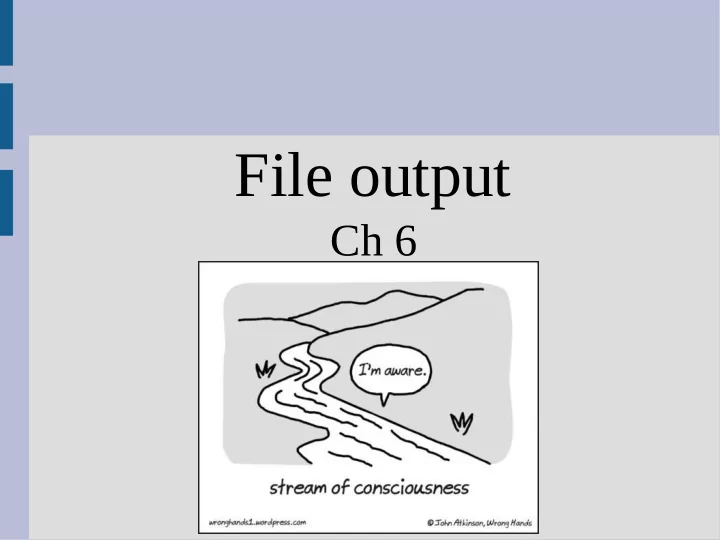

File output Ch 6
Highlights - text file output - text file input
Download vs stream
Streams A “stream” is information flow that is immediately processed For example: Streaming video is watch as data arrives Downloading video stores it for later For file input/output (file I/O), we will have to create a stream between file and code
Data persistence The temperature decay problem from last lab had multiple inputs (annoying to re-enter) What if you had a large amount to input to your program? 100 inputs? 1,000,000 data points for predicting weather?
Data persistence Files are also nice, as you can look them up at a later time After your program output ends, the text disappears (unless you re-run it) Files stay on your computer forever (until comp dies)
“Opening” a file File output is very similar to terminal output, except we have to open and close files To create a stream between a variable name and file name: Variable name Type File name
“Opening” a file Sometime you cannot open a file (don't have permission) You can check if the file actually opened by calling fail() (returns true if did NOT open): exit() in <cstdlib>, causes program to terminate
Writing to a file After you have opened a file (stream), you can then write to it This is done in an almost as cout, except you use the your variable name for the file Terminal: File:
Writing to a file Before: cin cout
Writing to a file After: cin cout out (ofstream)
File output imports To use ofstream type, you need to include <fstream> This gives you ofstream (output file stream) and ifstream (input file stream), which we will see next (See: helloWorldFile.cpp)
Closing a file Once we are done writing to a file, we should close the stream This is an extremely complicated process: Variable name If you don't close your stream, something might be left in the buffer
Closing a file Make sure I own... Remove this line (See: needClose.cpp)
Where did this file go? The default “path” for a file is where your cpp file is located You can specify the path when you open the file: You can also use relation operations:
Appending to files What happens if I run HelloWorldFile multiple times? Open file and override: Open file and append: (See: helloWorldFileAppend.cpp)
File writing overview - You need to open a file before writing to it - You should close the file when you are done - You can either override or append to files - Use .fail() to see if file actually opened - You cannot go backwards and “replace” or “undo” - You cannot “preppend” to a file (must either append from end or override)
Caution! Be careful about writing an infinite loop while outputting to a file You will very quickly run out of hard drive space If you think it is stuck in an infinite loop, press ctrl+c to kill the program (from the window) (see: nomNomHD.cpp) https://www.youtube.com/watch?v=_95I_1rZiIs
File input Ch 6
Writing to a file Before: cin cout out (ofstream) Guess what happens next?
Writing to a file Now: cin cout in out (ifstream) (ofstream)
File input Input is similar to output, we need to open a stream then use it similar to cin (See: fileInBasics.cpp) What is a major difference between reading and writing to a file?
End of file (EOF) When there is nothing left in a file to read, we call it end of file C++ is fairly nice about handling EOF, and you can detect it in 3 ways: reads from file does not read from file (just tells if at end)
End of file (EOF) Reading from file can be a bit tricky as the end of file is not detected until you try to read but then fail because there is nothing there This can cause issues with counting the last input twice To avoid this, make sure you right after “in >> var” you check if EOF (see: fileInput.cpp)
Formatting You can use also use setf() on your streams, but you can also use setw() and setprecision() from <iomanip> setw(x) reserves x spaces (right justify) (See readTable.cpp)
Recommend
More recommend